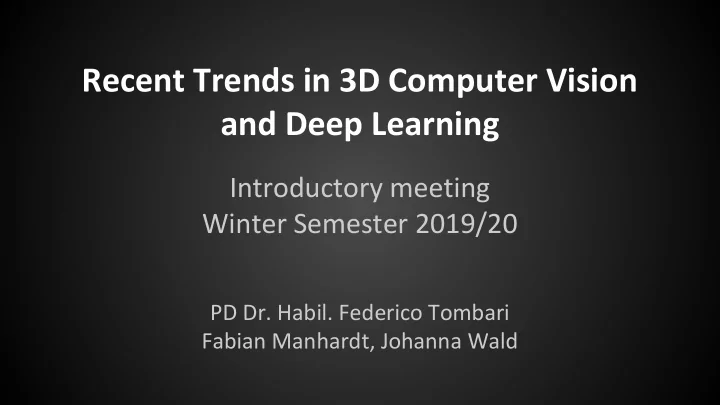

Recent Trends in 3D Computer Vision and Deep Learning Introductory meeting Winter Semester 2019/20 PD Dr. Habil. Federico Tombari Fabian Manhardt, Johanna Wald
Goals ● You are going to learn: ○ about relevant recent trends in the field of 3D Computer Vision and Deep Learning ○ how to read and understand a scientific article ○ how to write a scientific report ○ how to give a talk to an audience, and deal with related questions afterwards
Topics Covered Papers will cover different aspects of the topic ● Pose Estimation (6D Object / Human) ● Neural 3D Rendering ● SLAM ● 3D Scene Understanding ● Object & Scene Reconstruction / Completion
SLAM S. Zhi, M. Bloesch, S. Leutenegger, A. J. Davison, SceneCode: Monocular Dense Semantic Reconstruction using Learned Encoded Scene Representations CVPR 2019
3D Scene Understanding X. Liu, C. R. Qi, L. J. Guibas "FlowNet3D: Learning Scene Flow in 3D Point Clouds" CVPR 2019 S. Shi, X. Wang, H. Li “ PointRCNN: 3D Object Proposal Generation and Detection from Point Cloud ” CVPR 2019
3D Object Reconstruction and Scene Completion J. J. Park, P. Florence, J. Straub, R. Newcombe, and S. Lovegrove DeepSDF: Learning Continuous Signed Distance Functions for Shape Representation CVPR 2019
6D Object Pose Estimation C. Wang, D. Xu, Y. Zhu, R. M.-M., C. Lu, L. Fei-Fei, and S. Savarese “DenseFusion: 6D Object Pose Estimation by Iterative Dense Fusion” CVPR 2019 H. Wang, S. Sridhar, J. Huang, J. Valentin, S. Song, and L. J. Guibas “Normalized Object Coordinate Space for Category-Level 6D Object Pose and Size Estimation” CVPR 2019
Human Pose, Shape and Motion Recovery Kanazawa, Angjoo, Jason Y. Zhang, Panna Felsen, and Jitendra Malik. "Learning 3d human dynamics from video." In Proceedings of the IEEE Conference on Computer Vision and Pattern Recognition , pp. 5614-5623. 2019. Peng, Xue Bin, Angjoo Kanazawa, Jitendra Malik, Pieter Abbeel, and Sergey Levine. "Sfv: Reinforcement learning of physical skills from videos." In SIGGRAPH Asia 2018 Technical Papers , p. 178. ACM, 2018. C.-H. Chen, A. Tyagi, A. Agrawal, D. Drover, R. MV, S. Stojanov, and J. M. Rehg "Unsupervised 3D Pose Estimation with Geometric Self-Supervision" CVPR 2019.
Neural 3D Rendering H. Kato, Y. Ushiku and T. Harada “Neural 3D Mesh Renderer ” CVPR 2018 A. Kanazawa, S. Tulsiani, A. A. Efros and J. Malik “Learning Category-Specific Mesh Reconstruction from Image Collections ” ECCV 2018 H. Yao, T. M. H. Hsu, J.-Y. Zhu, J. Wu, A. Torralba, W. T. Freeman and J. B. Tenenbaum “ 3D-Aware Scene Manipulation via Inverse Graphics ” NeurIPS 2018
Seminar Schedule ● Sessions are on Wednesday, 10am-noon ● Three presentations per session (aiming for 5 sessions in total) ● The list of papers will be available after the matching session - first come first served ● Seminarraum 03.13.010
Presentation ● Each presentation is 20 minutes + 10 minutes for Q&A ● Based on slides (Powerpoints and Latex are provided on the website) ● The presentation should cover all relevant aspects of the paper ○ Introduction and state of the art ○ Main contribution(s) ○ Experimental results ○ Discussion, summary and future work ● The presentation should be self-contained ● All students are expected to attend all presentations and interact during Q&A (this will influence your final mark)
Report ● The report should summarize the paper in the way it has been presented during the talk ● Language: English ● Max 8 pages ● Template also on course webpage ● Once ready, send the report to supervisor, within two weeks from the day of the presentation
Evaluation criteria ● Quality of presentation (both regarding slides and speech) ● Quality of the report ● Comprehension of the scientific contents of the presented work ● Interaction and participation during the other talks
Recommend
More recommend